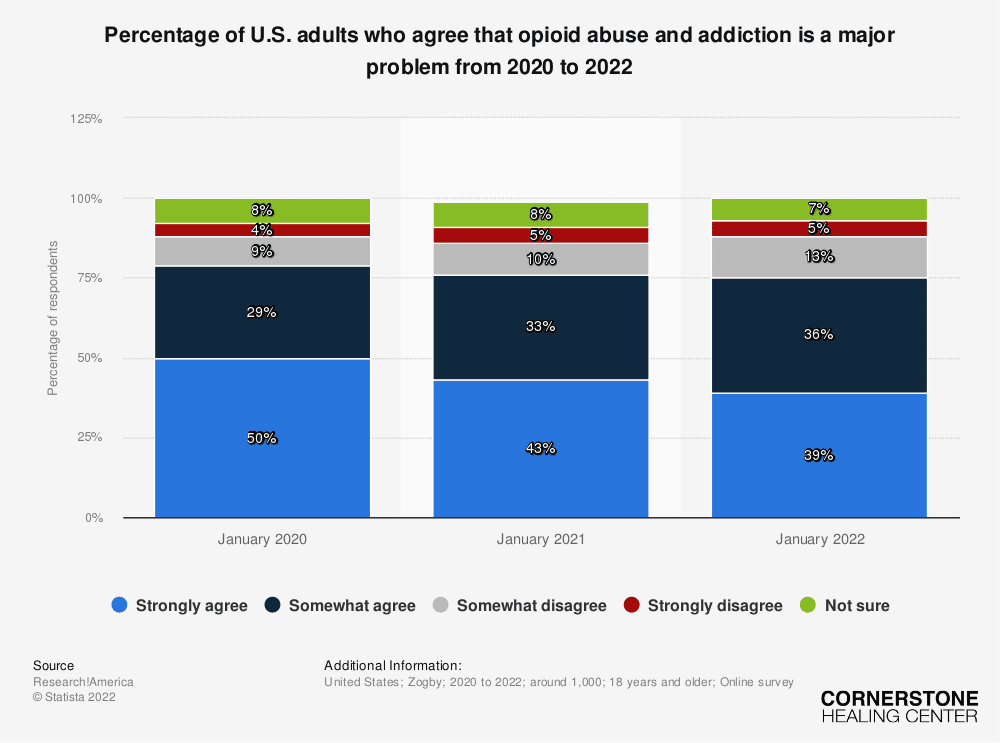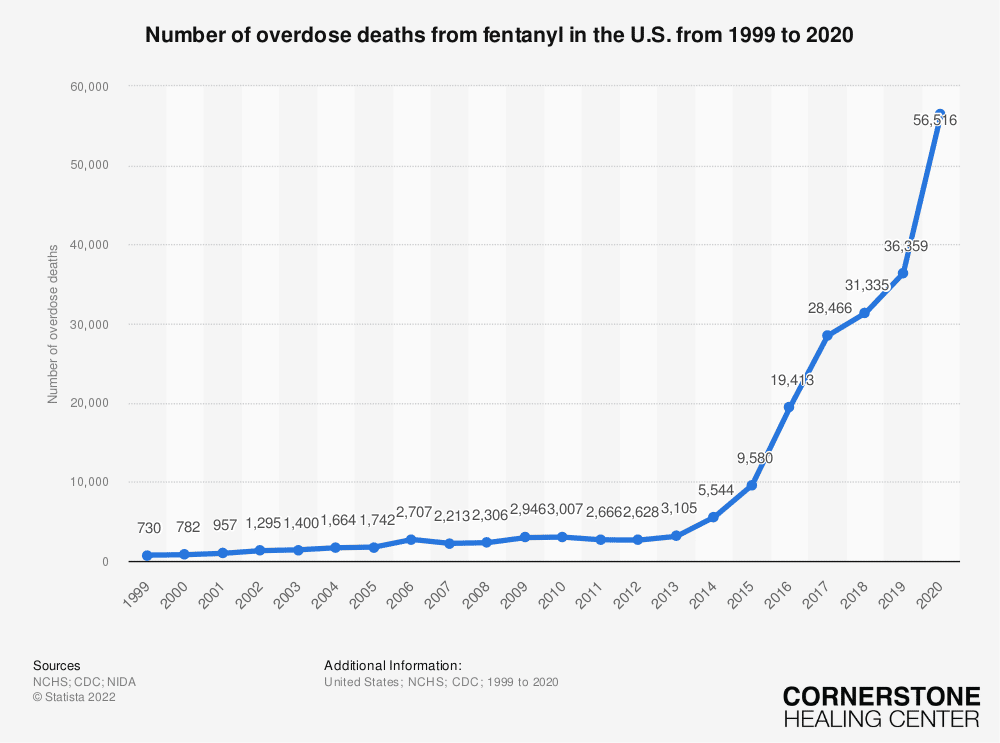Does the American public still view the opioid crisis as a major problem? Does America care? New data released describes the American sentiment towards the opioid epidemic and how attitudes are shifting away from seeing the opioid epidemic as a major focus of concern, likely due to major economic issues like inflation and the difficult political climate.
Searching for help with drug and/or alcohol addiction? Call us now at (888) 583-3480.
The Fentanyl Problem, Synthetic Opioids, and Unintentional Overdose
Fentanyl is highly contributing to the opioid crisis. While some users take fentanyl intentionally, the vast majority ingest it inadvertently. It has become increasingly common for illicit dealers and suppliers to use fentanyl to “cut” or mix with other drugs to add potency and cut costs.
Fentanyl is most often mixed into heroin, morphine, and other opiates, to which its effects are most similar, though it is also used to cut cocaine, ecstasy, methamphetamine.
There are also instances of fentanyl disguised as prescribed medicines like oxycodone and codeine. When mixed with heroin, cocaine, or other drugs in powder form, fentanyl is effectively impossible to identify, especially to the untrained eye of the recreational user.
Like other synthetic opioids, fentanyl was designed for medical use to treat patients with severe pain. It is up to 100 times more potent than morphine.
Fentanyl and other synthetic opioids play a major role in national overdose and death rates, both of which have jumped significantly in the past ten years. 2011 saw 2,666 overdose deaths related to fentanyl and synthetic opioids in the United States, while 2018 saw over 31,000.
A large part of the rise in deaths is attributed to increasing instances of accidental overdose by users who do not know that they’re taking fentanyl instead of another drug.
Fentanyl’s widespread use as a covert cutting agent makes it responsible for a dramatic rise in unintentional overdoses and deaths across the United States. Nearly 60% of opioid-related deaths in 2017 involved fentanyl.
The past decade has seen an alarming spike in reports of illicitly-produced fentanyl sold as other drugs, such as heroin and cocaine, leading to accidental overdose even by veteran heroin users who think they’re taking a “safe” amount of the drug.
Its potency means that fentanyl produces a swift, fatal overdose at a much lower margin of ingestion than other opioids. Fentanyl overdose is marked by stupor, detachment from reality, unresponsiveness, unconsciousness, coma, and death by respiratory failure and organ shutdown.
Do Americans See the Opioid Epidemic as a Major Problem?
A considerable amount of Americans view the opioid epidemic as a serious problem. Although, the number of Americans who strongly agree is declining year over year, perhaps likely to other societal issues such as inflation, the aftermath of the pandemic, and more.
Even though the percentage of people who view the opioid crisis as a problem is dropping year over year, the problem needs to be dealt with.
Opioid addiction has become a major public health problem. Several factors have contributed to the opioid crisis, including the over-prescription of opioid painkillers, the easy availability of these drugs, and the rise of cheaper heroin. In response to the opioid crisis, many states have enacted stricter laws governing the prescription of opioids.
However, this has not always been effective in curbing abuse and addiction. Treatment for opioid addiction is also costly and often requires long-term care. As the opioid crisis continues to grow, it is important to find ways to prevent abuse and provide treatment for those who are addicted.

What’s Currently Being Done About The Opioid Epidemic?
The opioid epidemic is a national crisis requiring a multi-pronged approach. Law enforcement officials are working to crack down on the illegal supply of opioids, while medical professionals are working to identify better and treat patients who are at risk for addiction.
In addition, public health campaigns are underway to raise awareness of the dangers of opioid use and to provide resources for those struggling with addiction.
While there is still much work to be done, these efforts are helping to make a difference in the fight against the opioid epidemic.
Is There Enough Access to Treatment for Opioid Addiction?
This national epidemic has caused a sharp increase in the demand for treatment, but unfortunately, many people cannot get the help they need.
In 2017, only 1 in 4 people with an opioid use disorder received any treatment, and less than 10% received medication-assisted treatment.
The lack of access to care is especially pronounced in rural areas, where fewer providers and patients often travel long distances to get help.

How Did COVID Affect the Opioid Crisis?
The Covid-19 pandemic has profoundly impacted the opioid crisis in the United States. The already-compounded stresses of job loss, social isolation, and financial insecurity have led many people to use drugs to cope.
At the same time, the pandemic has made it harder for people to access treatment and support services.
In addition, the closure of schools and other community gathering places has meant that people struggling with addiction have lost important sources of social support.
As a result, the Covid-19 pandemic has exacerbated an already dire situation, and the death toll from opioid overdoses will likely continue to rise in the coming months.
Getting Help for Fentanyl or Opioid Abuse
If the opioid epidemic has personally touched your life and you find yourself misusing opioids, please listen. Fentanyl and similar opioids are often underestimated as far as deadliness by users. Getting help for fentanyl use is critical, and you must seek immediate professional treatment for detoxification and recovery.
Medical-grade facilities and dedicated substance abuse programs can take swift measures to counter fentanyl abuse, addiction, and overdose.
One countermeasure is naloxone, an antidote designed to reverse opioid-related overdoses and prevent death. While most cases of heroin overdose require one naloxone shot, fentanyl is so powerful that a single overdose may require multiple doses of antidote.
A comprehensive recovery program will help you or your loved one make it through the painful and potentially dangerous period of detox and acute withdrawal, overcome the physical and psychological holds of addiction, and learn to rebuild your life in sobriety.
Professional guidance is necessary when seeking treatment for fentanyl or any other synthetic opioid for a successful and safe recovery.
Opioids pose a severe and nearly invisible threat to anyone who uses opioids outside of medical supervision. Its prevalence and fatality rates make it critical to seek professional help for yourself or a loved one in the event of an opioid overdose or addiction.
At Cornerstone Healing Center in Scottsdale, Arizona, we use evidence-based treatments to rapidly assess and treat substance-related emergencies and break the cycle of dependency.
Our compassionate, expert staff is ready to guide you through detox, manage your withdrawal, and help you rebuild your life in strength and sobriety.
We provide a comprehensive approach to healing you as a person, not just a collection of symptoms. Once you’re ready to go home, our tight-knit community lends structure and companionship throughout the crucial first year of your recovery.
You don’t have to struggle with addiction on your own any longer. Reach out to Cornerstone Healing Center today. Call (888) 583-3480. to learn more.





